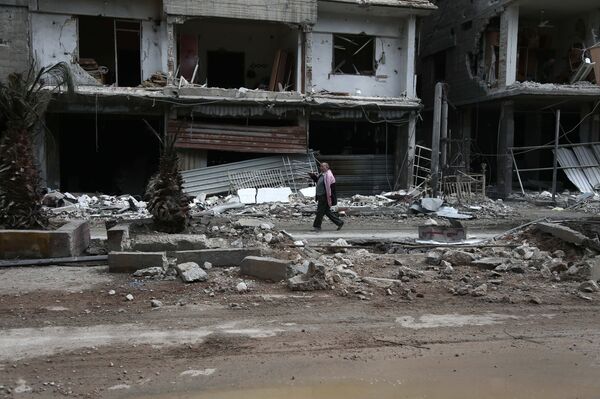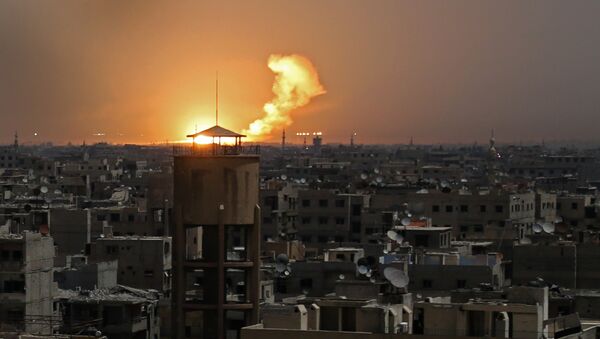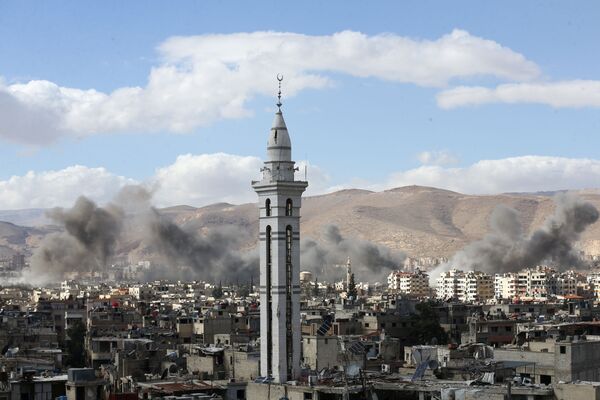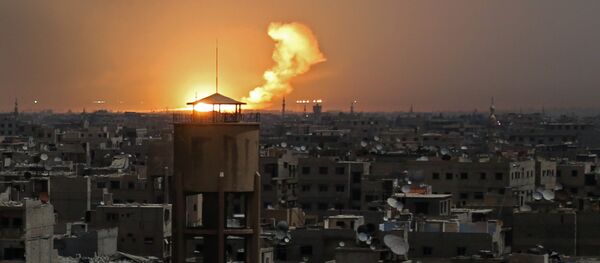Former militants and regular troops can be seen at the checkpoints outside Beit Jinn, a town next to Mount Hermon in the Qalamoun region, which was fairly recently a place of fierce skirmishes.
A Sputnik correspondent spent a day with the "pacified" fighters of the "Hermon Regiment" and found out what made former members of the Free Syrian Army (FSA) side with the Syrian government forces, and how effective the idea of reconciliation and the joint fight against terrorism in Syria truly is.
I get pulled over at the last checkpoint in the vicinity of Beit Jinn by bearded gunmen and several men clad in the regular Syrian army uniform. As everywhere in the local mountains, this place is quiet and planted with countless bare fruit trees.
Troublesome Checkpoint
"Here is a successful example of those who were granted amnesty and abandoned radical groups. They are standing here and guarding. You're a Russian, and I'm an officer of the Syrian army, which will not prevent them from capturing us, taking your car and selling us to terrorists. But these are stereotypes. They are no longer militants," officer Zein said in a low voice, smiling, as a soldier walks from the checkpoint to our car.
Zein quickly explained the purpose of our visit to a man with an assault rifle and asked where we can park our car.
"Welcome, my name is Mohamed," the soldier said pointing to the chair and lowering the gun.
However, Zein’s joke was still causing the adrenaline rush in my body as I pictured more unpleasant scenarios coming my way. But the silence of the mountains and the smell of smoldering wood from a rusty stove soothe my emotions.
Homeland
I approached Mohamed and asked him several questions. The soldier stopped smiling but was willing to keep on the conversation.
"You see, living in Quneitra, we never wanted to do harm to our country. We thought from the beginning that being in the ranks of the FSA, we will make our country better, but then there were foreign commanders from Saudi Arabia, Lebanon, Jordan and other countries, and it became clear to us that the war is dividing and destroying our country, and we started looking for ways to talk with the government through intermediaries. We said we wanted to return to peaceful life and do not want to fight against the army," Mohamed said.
An older man in a greasy knitted sweater joined our conversation saying that the border with Jordan and Israel was not far from that place. The militants who came to this area felt comfortable in Quneitra. They received assistance from neighboring countries and medical help and money from their Saudi patrons.

"But they have been taking advantage of us for almost three years now, and life has only gotten worse. We do not want our land to be taken by Israel or someone else. It was a mistake to join the ranks of the free army, and the 'army' was far from being free," the man said without hiding his anger.
Zein also took note of the tension and waved to a soldier as, out of the blue, the situation seemed to be escalating. The soldier made a beeline for the spot where we were sitting and talking, made a joke, and everyone burst into laughter.
"It is a shame a joke cannot take care of all the problems," Zein said.
Call to Eastern Ghouta
Having passed the "adaptation" process amid armed farmers, we began to dig deeper and started a conversation about the situation on the other side of Damascus in Eastern Ghouta. The question was simple: why did not they follow the example of the Golan Heights?
"We are doing our best to tell the guys in Ghouta that they are being misled, that the bloodshed should be stopped and foreigners driven out, as we drove them out of here. But things are more complicated there, there are many mercenaries, terrorists from Nusra, Jaysh Islam and other groups. They are holding everything in their hands and forcing young men from Ghouta to go to war," Mohamed said.
According to former "brothers in arms" there is too much politics in Eastern Ghouta. Ghouta is a good place to shell Damascus from, and to exert political pressure on the leaders of the country and foreign countries, both Western and Arab countries, which have much clout in that region.
READ MORE: Syrian Army to Lay Siege to Two Terrorist Bulwarks in E Ghouta — Reports
Unlike the villages in the Golan Heights, militants in Eastern Ghouta keep hundreds of thousands of people as a human shield. There are many mercenaries among the militants and their mission is to prevent at all costs the civilians from fleeing to the areas controlled by the government.
"I want to call the guys in Ghouta to take up arms against the mercenaries. They must restore peace for the sake of their families while they can. We were able to do this, and they can do it, too," Mohamed urged.
Issue of Trust
I chatted with the militants at the checkpoint until dusk and wondered if it was possible to go to the town of Beit Jinn, but Zein hinted diplomatically that it was time to return to Damascus. I had many questions left unanswered.





